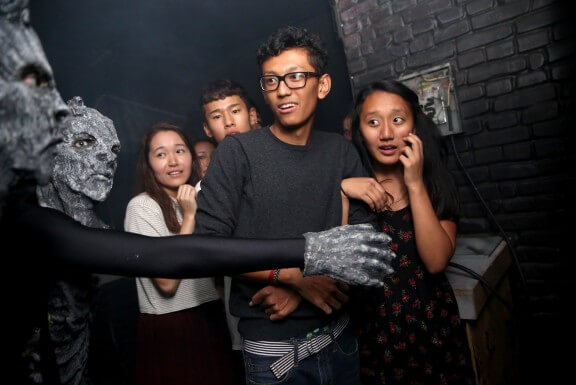 Reese Witherspoon thankfully has less screentime than Ger Duany in “The Good Lie,” which is not a reflection of her talents but about how it actually pays attention to its Sudanese subject.
Reese Witherspoon thankfully has less screentime than Ger Duany in “The Good Lie,” which is not a reflection of her talents but about how it actually pays attention to its Sudanese subject.
Credit: Warner Bros. Pictures
‘The Good Lie’
Director: Philippe Falardeau
Stars: Reese Witherspoon, Arnold Oceng
Rating: PG-13
2 (out of 5) Globes
The “Lost Boys of Sudan” — the name given to the over 20,000 war orphans, some of whom were sent to America — have long been a cottage industry among filmmakers. Numerous documentaries cover their plight, usually their attempts to assimilate in a Western land that rescued them then expected them to conform to society and earn their keep. “The Good Lie” is the perhaps belated splashy Hollywood version: the one aimed at the hearts of moviegoers (and AMPAS voters), boasting producer credits from Ron Howard and Brian Glazer, plus a token white movie star to get butts in the seat in the first place.
Reese Witherspoon’s face is all over the advertising, but her character — a sassy, worldweary social worker who tends to three of the “boys” — doesn’t appear till the 40 minute mark and then never quite takes over the narrative. This isn’t just another film that puts a white face on the black experience, as in “Cry Freedom,” “Mississippi Burning” and “The Last King of Scotland.” It really is about three young men (Arnold Oceng, Ger Duany and Emmanuel Jal) trying to make a go in a new land. In fact, the first few reels belong to them, covering their plight as children trying to survive in a war zone.
That doesn’t mean it doesn’t succumb to genre cliches anyway. Our leads may have the most screentime, but they’re still treated as others. Only two of the three get personalities, and then minimally at that. Oceng’s Mamere is the hard-working do-gooder while Jal’s sullen Paul is the one who turns self-destructive in his new home. Meanwhile, Duany — who already played a refugee-in-America 10 years ago in “I Heart Huckabees” — mostly just seems nice and vaguely principled. We don’t get to know them beyond these basic traits — but then we don’t get to know anybody, from Witherspoon to Corey Stoll’s blue collar dude. One could read this as a perverse form of equality, where no one gets fleshed out.
There’s a fair amount of requisite “laugh at the third world denizens trying to figure out escalators” jokes, previously seen this year in “Million Dollar Arm.” Meanwhile Witherspoon is tasked to basically do an Erin Brockovich impression — the tough talker with a not-too-secret heart of gold, who barks at stuffy, heartless bureaucrats. Still, that it never forgets who its real stars are is relatively refreshing, and a Hail Mary that also explains the inscrutable title very nearly produces genuine warmth. “It could be so much worse” isn’t much of a compliment, but it is in this type of filmmaking.
Follow Matt Prigge on Twitter @mattprigge

















